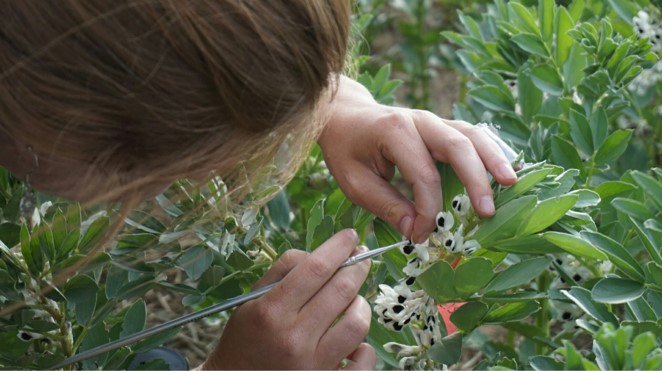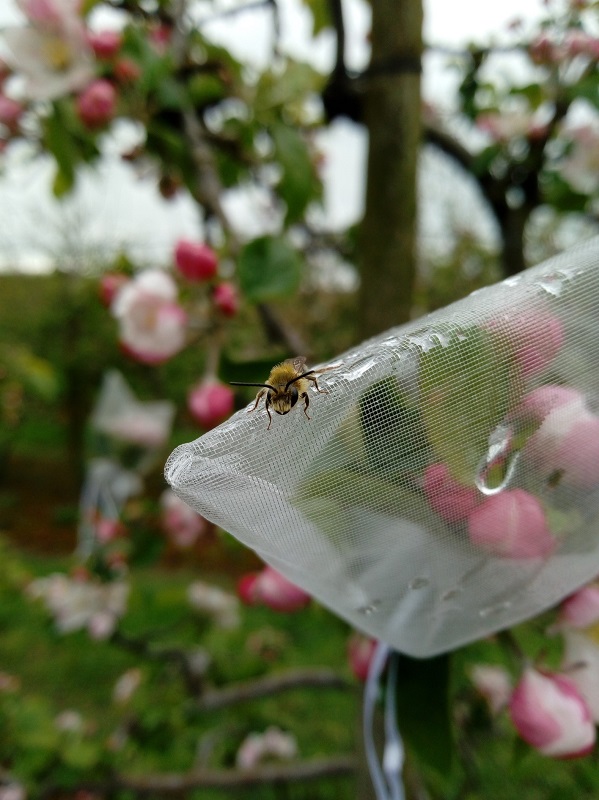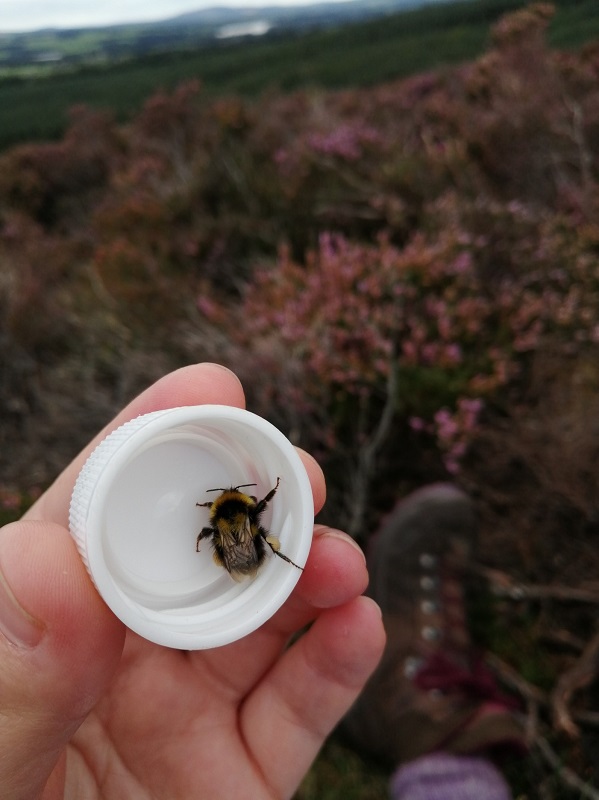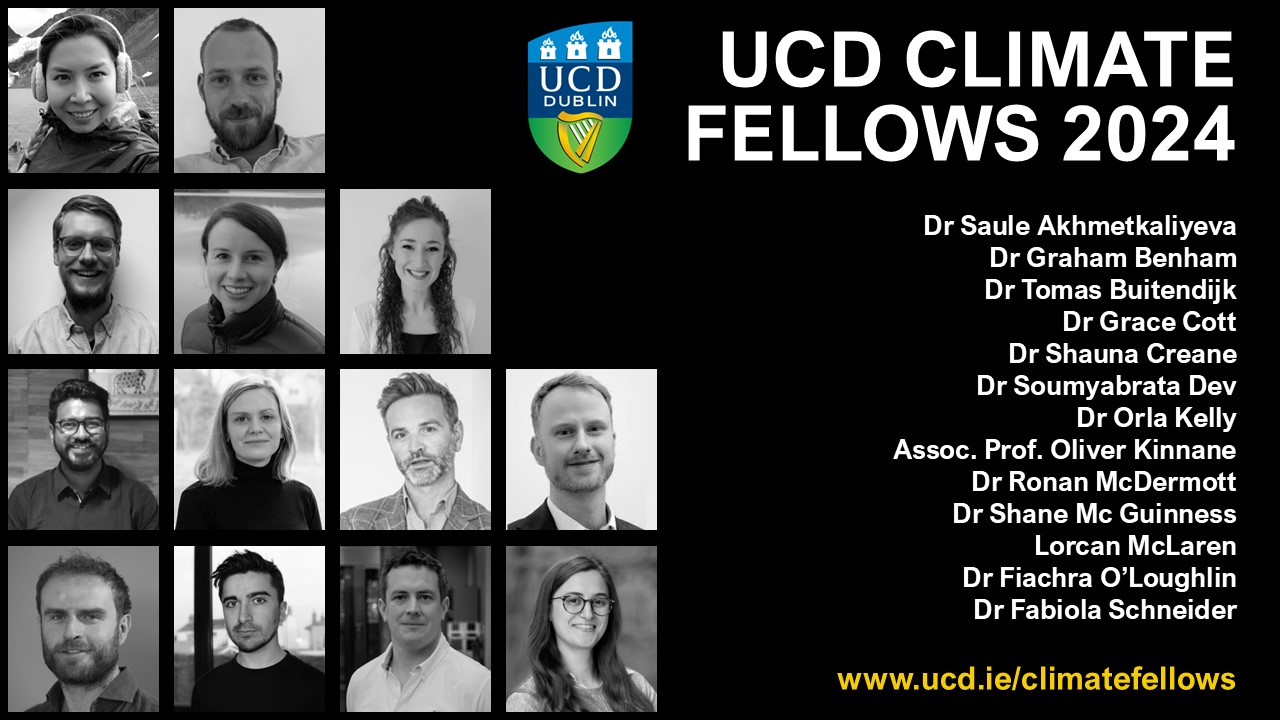Katherine Burns commended in 2021 ESAI Postgraduate Researcher of the Year competition
Congratulations to former Earth Institute Associate Member Katherine (Katie) Burns, who was highly commended as part of the 2021 ESAI Postgraduate Researcher of the Year for her project working on contributions and conservation of Irish Pollinators in Ireland. Her supervisor is Earth Institute member Dr Dara Stanley.
Katie's supervisor Dr Dara Stanley said, "Katie's research has shown that a wide range of both wild and managed pollinators are involved in the pollination of Irish crops. She has provided a large and thorough body of work which helps us to understand the dynamics of crop pollination, but also how we perceive pollinators and the threats they face, in Ireland."
We spoke with Katie to find out more about her highly commended research, her involvement with the Earth Institute, and what she's up to now.

Katie Burns hand-pollinating a bean flower
Tell us a bit about the research for which you received the commendation.
The aim of my PhD research was to address key gaps in the current knowledge of the contributions and conservation of insect pollinators in Ireland. Insect pollinators, such as bees and flies, play a critical role in the maintenance of ecosystems and production of insect pollinated crops. However, there is mounting evidence that insect pollinator populations are in decline worldwide. These declines have significant and disturbing implications for ecosystem function, crop production, and human health, which means that it’s more important than ever for us to investigate the importance of insect pollinators, the pressures influencing their declines, and strategies to effectively conserve them. Therefore, my research investigated the contributions of insect pollinators to Irish crops, potential competition between managed and wild bees in semi-natural areas, and the public perceptions of insect pollinators.
The findings of my research provide further evidence of the importance of pollinators for crop production, suggesting that managing wild pollinator populations in agroecosystems may have economic incentives. I also identify areas of future conservation focus (e.g., managed honeybee usage in semi-natural areas) and highlight the need to continue engaging the public in pollinator conservation initiatives. Overall, the findings of my work have implications for public policy and pollinator management techniques both in Ireland and abroad.

Solitary bee on a pollinator exclusion bag in an apple orchard
How you feel about receiving the commendation?
I am very honored to have received this commendation! It feels really wonderful to know that others recognize the value of this type of research and the importance of “the little things that run the world”. Insects, and especially insect pollinators, are incredibly important and beautiful but are so often undervalued due to the ingrained biases and fears that humans have towards them. To receive a commendation on work related to insect pollinators shows that we are really moving in the right direction.
Tell us a bit about your membership to the Earth Institute.
During my time at UCD, I was an associate member of the Earth Institute and one of the founding members of the Earth Institute Associate Members Committee. The main goal of this committee is to provide advice for the Earth Institute to promote and support the needs of UCD postgraduates and postdoctoral researchers, as well as technical and support staff, involved in environmental research. While part of the committee, I helped organize both the 2021 Earth Week Flash Talk Competition and the “A-Z Of Environmental, Climate and Sustainability Research” project on the Earth Institute website. Both of these initiatives were designed to provide a fun and engaging way for associate members to share their research interests with other members and to generally promote multidisciplinary research.

Bumblebee about to be released after being measured
What are you up to now?
I am back in the United States and working for the Rhode Island Department of Environmental Management (Division of Fish & Wildlife) as a pollinator entomologist. I was hired to design and implement the “Rhode Island Pollinator Atlas”, which is an effort to comprehensively inventory Rhode Island’s pollinating insects and to inform actionable conservation plans to protect insect pollinators and the services that they provide. Currently, I’m working on the “Rhode Island Bumblebee Survey”, which is a statewide, community science project that I designed to document the status and distribution of Rhode Island’s bumblebees. I’ve also been working on some fun outreach and educational materials to spread the buzz about insect pollinators!
On a personal note, I recently adopted a very cute dog named Elvis and I am marrying my partner, Beau, this summer. Exciting times!
Further information
Read more about Katherine’s research here and see the two journal articles published from her 2021 PhD thesis, "Contributions and conservation of insect pollinators in Ireland.":
Katherine L.W. Burns, Dara A. Stanley, "The importance and value of insect pollination to apples: A regional case study of key cultivars," Agriculture, Ecosystems & Environment, Volume 331 (2022).
Katherine L.W. Burns, Úna Fitzpatrick, Dara A. Stanley, "Public perceptions of Ireland’s pollinators: A case for more inclusive pollinator conservation initiatives," Journal for Nature Conservation, Volume 61 (2021).


